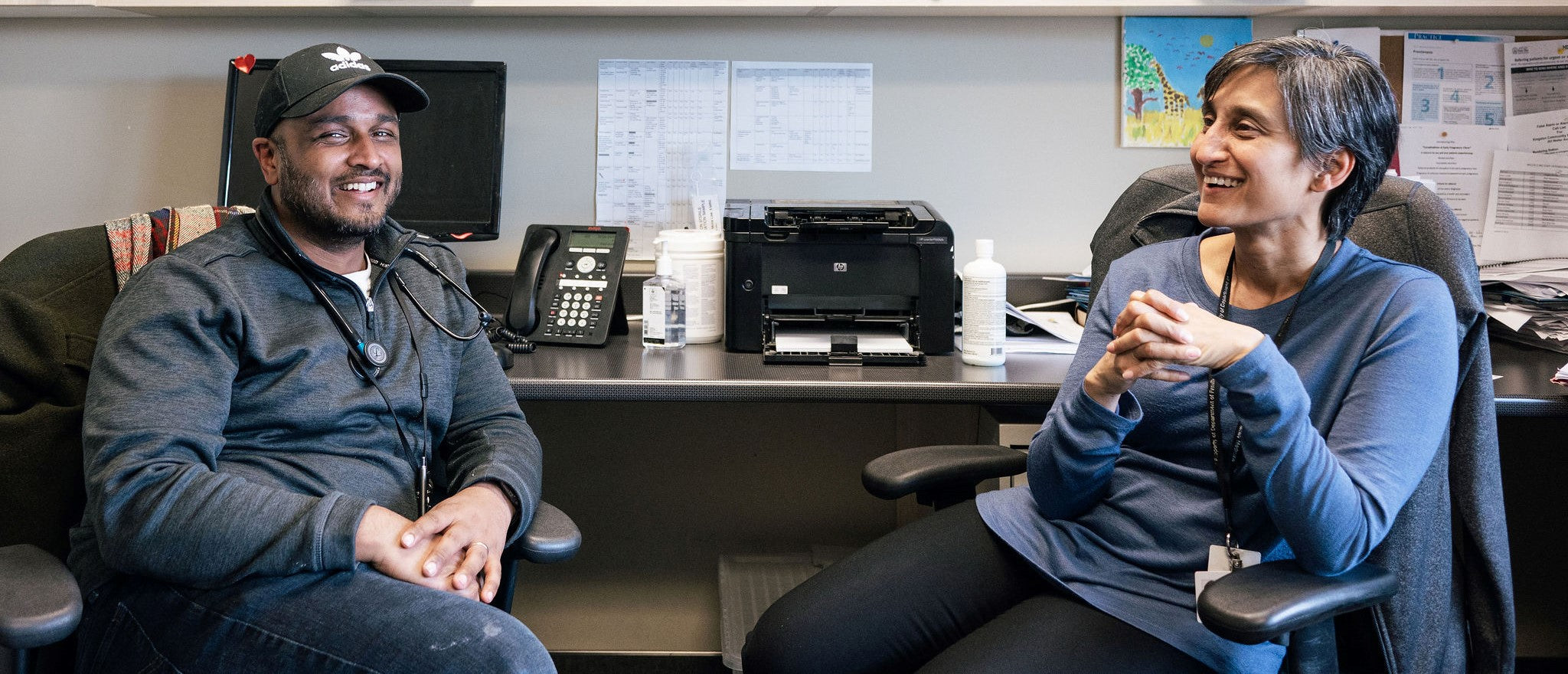
Team-based care: A collaborative approach to health-care delivery
August 12, 2024
In the ever-evolving health-care landscape, the growing adoption of team-based care models is transforming how health and wellness professionals approach people-centred care. Unlike traditional care models that often rely on a single provider, team-based care emphasizes collaboration among diverse health and wellness providers to deliver comprehensive care. This approach is central to the FLA OHT’s vision for health-care design and delivery. We recently spoke with health-care practitioners at FLA OHT partner Kingston Community Health Centres (KCHC) to explore the dynamics of this model and learn more about team-based care in action in our community.
Understanding the team-based care model
Team-based care is a collaborative approach where health and wellness providers - such as nurse practitioners, nurses, physicians, social workers, and other allied health professionals - work together, uniting their unique skills to optimize outcomes for community members and meet their comprehensive needs. This model enhances quality of care and promotes a people-centred approach where individuals benefit from diverse expertise and perspectives. It aims to comprehensively address all aspects of a person’s health—mental, physical, emotional, spiritual, and social—while also providing wellness support to maintain good health, emphasizing not just treatment during times of need but ongoing care and prevention. The Community Health Centres (CHC) sector has been offering team-based care for many years and has extensive experience with this model of health care.
Benefits for people and providers
Dr. Rupa Patel, a family physician at KCHC and Assistant Professor, Queen’s Department of Family Medicine emphasizes the advantages of this model: “It’s a huge benefit to primary care providers to have another person responsible for the same group of patients,” she explains. “At KCHC, our patients are assigned to a Medical Doctor (MD)/Nurse Practitioner (NP) dyad. We cover for each other during vacations, problem-solve daily issues together, and make collaborative decisions. For us as providers, it means less burnout and more support. For patients, it's about having access to a team that understands their needs and works together to meet them. There’s better continuity of care, which actually reduces Emergency Room visits and hospitalizations, and improves quality of care overall and ultimately reduces health-care costs. We believe that the MD/NP dyad model of primary care is an ideal model for patients and providers. There is also evidence that this model of care offers cost savings, fewer referrals and improves patient satisfaction.”
Another example of the team-based model in action in our community is the Well Baby Care Clinic, a Health Home for infants who do not have a primary care provider. The clinic is led by Nurse Practitioners, with collaborative support from nursing and medical professionals, fostering an interprofessional approach to well-baby care while addressing a critical gap in primary care for infants in the region. The Well Baby Care Clinic was established in September 2022, under the leadership and guidance of Dr. Patel and Dr. Mary Rowland of KCHC, alongside KCHC Clinical Director Meghan O'Leary.
Maggie McNabb, a Nurse Practitioner at KCHC, further underscores the benefits of team-based care in that it reduces communication silos, “In the team model, it’s all conversational. We share knowledge and consult each other, ensuring we’re all on the same page and providing holistic care. We can bounce cases between physicians and nurse practitioners. If something gets too complex, we manage it together rather than referring out, ensuring that patients receive the best possible care.”
This collaborative environment allows patients to benefit from a wide range of services through a single access point, making it easier to address their comprehensive health and wellness needs. Providers can consult each other, enhancing their knowledge and expanding their scope of practice.
Building the future of team-based care in the region
Working with the FLA OHT, KCHC is leading efforts to expand team-based care throughout the region. New Health Homes, like the new Midtown Kingston Health Home, are set to embody this model's principles by integrating health education, social programs, and community supports. These initiatives aim to enhance community well-being and ensure accessible, coordinated care for all.
Moreover, the FLA OHT is collaborating with existing Health Homes, such as family health teams, to optimize their teams towards a neighbourhood model of care and support provision. We are providing guidance on the effective implementation and measurement of team-based approaches that will realize Health Home principles and the quintuple aim, ensuring that care delivery is not only coordinated but also continuously evolving.
By fostering a supportive and collaborative environment, team-based care improves patient outcomes and creates a more satisfying work environment for health-care providers. The FLA OHT’s commitment to this model reflects our broader goal of improving health outcomes and building healthier communities. By focusing on team-based care and providing the necessary support and guidance at population and neighbourhood levels, the FLA OHT is helping pave the way for a more coordinated, efficient and holistic health-care system.
